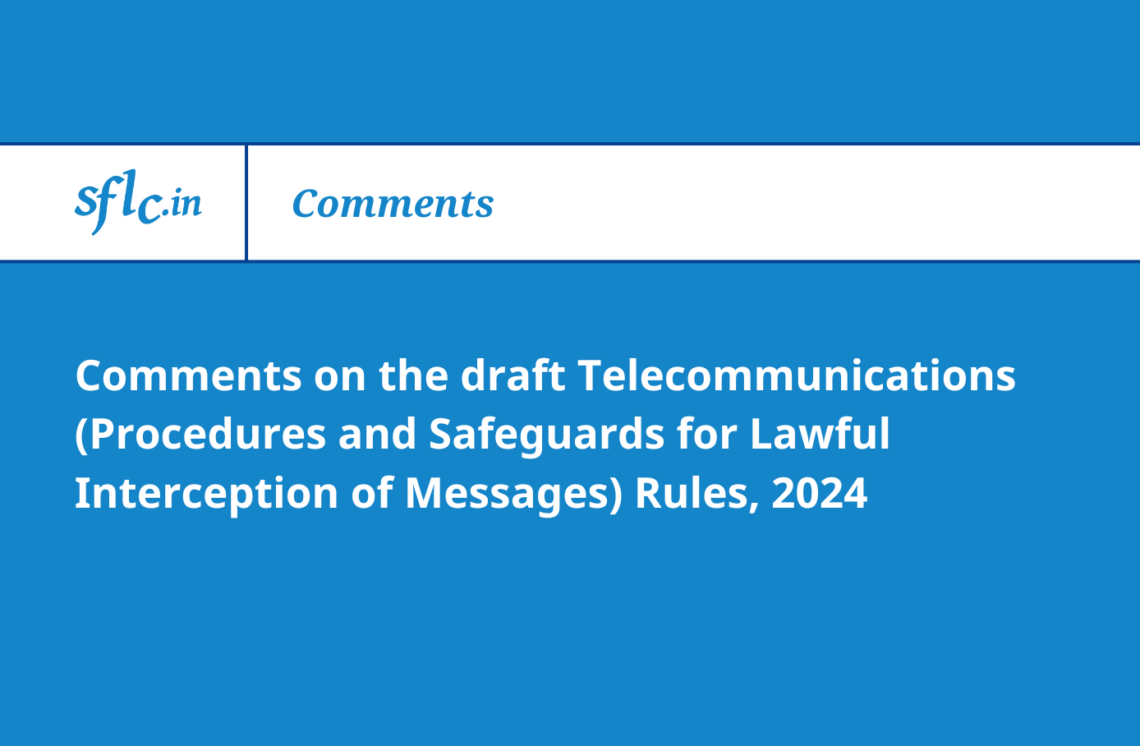The Draft Telecommunication Rules on interception disregard privacy entirely!
The Department of Telecommunications (DoT), Govt. of India released on 28th August, the draft Telecommunications (Procedures and Safeguards for Lawful Interception of Messages) Rules, 2024 (Interception Rules) and invited suggestions and objections from the stakeholders. The draft Rules published seek to repeal the Rules under 419A of the Telegraph Rules, 1951 (inserted through an amendment made in 2007). These Rules have been published under Section 20 (2)(a), (4), and 56 (2) (t)(u) of the Telecommunications Act, 2023. The Act, which was controversially passed sans much discussion was in the Parliament in December 2023 was notified on 21.06.2024, notifying the enforcement of several provisions of the Act that also included Section 20. The provisions deal with public emergency or public safety and empower the Central or the State Government to issue orders of interception under (2) (a) and suspension of the internet under (2)(b). These draft Rules draw their power from the former.
SFLC.in also submitted objections and suggestions on the draft rules, which are as follows:
1. The draft rules are mere verbatim of the Rule 419A of the Telegraph Act.
The draft while authorising the Home Secretary at the Central Government and the State Secretary in charge of the Home Department in the case of State and delegation to the Joint Secretary in unavoidable circumstances and in emergent cases to the Inspector General have not specified what could be the emergent cases in remote areas or unavoidable circumstance under which the competent authority will be entitled to intercept, monitor, or decrypt the messages. The Draft Rules maintain the executive control over the interceptions without any judicial oversight mechanism in place.
2. Lack of procedural safeguards:
The Draft Rules are in contradiction of Supreme Court’s landmark judgement in PUCL vs. Union of India 1997 1 SCC 301 in which the Hon’ble Court Court stressed the need for precise emergency definitions and safeguards to prevent misuse of executive powers during emergencies and demanded clarity on conditions under which interception can be initiated.
3. No Judicial or independent oversight mechanism.
Unlike the UK’s Investigatory Powers Act, 2016, the Netherlands’ Intelligence and Security Services Act, 2017, neither 2023 Act nor draft Rules provide for the judicial oversight mechanism, and the power of interception is solely vested in executives without check and balances. Additionally, the Review Committee designed to review the interception orders also comprises executives only and sits once in two months to review the legality of the orders.
4. The draft Rules omit Privacy which is now a fundamental right as held by the Hon’ble Supreme Court in KS Puttaswamy Judgment in 2017. The omission of privacy empowers the executives to impinge upon this very right.
Suggestions:
The 2024 Draft Interception Rules lack key safeguards present in Rule 419A of the Telegraph Rules, the PUCL judgement, and international best practices. To enhance the Rules the following measures are suggested:
- Introduce judicial oversight or independent review mechanisms to prevent executive overreach.
- Define emergency situations clearly and require retrospective judicial review for urgent interceptions.
- Limit interception to cases involving public emergencies or public safety concerns.
- Strengthen data retention policies with strict timelines and independent audits.
- Hold telecom service providers accountable through graded penalties and encourage whistleblowing.
- Provide for proactive disclosure of the numbers of interception orders passed on a periodic basis (eg. quarterly)
For detailed comments on draft Telecommunication (Interception) Rules, please read below:




